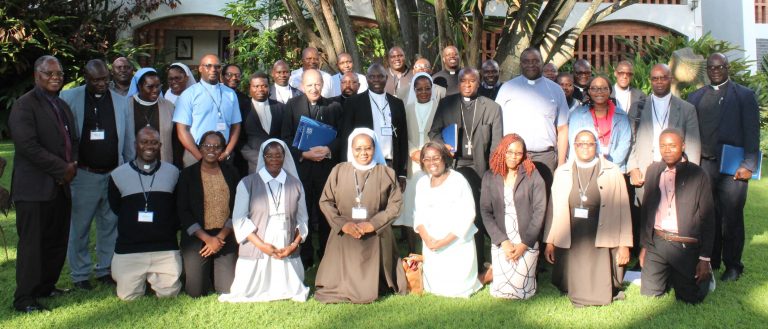
[ad_1]
By Br. Alfonce Kugwa

The Zimbabwe Catholic Bishops’ Conference 2023 Plenary Session held from 11-12 April 2023 deliberated on the role and effects of the Synodal process in the local Church, emphasising mutual listening to the voices of those marginalized and discernment of what the Holy Spirit expect of the Church. Different speakers emphasised on the importance of the Synod process in uncovering some of the unimaginable vices that the people suffer as a result of clericalism, neglect, social exclusion and all forms of abuse. The thrust of the Bishops’ Plenary was to share how the Synod process has and is managing to redress the imbalances caused sometimes by too much concentration of power on the Church leadership, unwillingness to listen and lack of concern for the marginalized.

The National Pastoral Director for the Zimbabwe Catholic Bishops’ Conference, Fr. Mgcini Moyo said the Synodal process continues to offer a platform that promotes dialogue and openness within the Church. The Plenary which was held under the theme; “Enlarge the space of your tent,” (Is 54:2), challenges priests, the religious and the entire Catholic community to be accommodative in their approach and to promote inclusivity of people in the periphery especially people living with disabilities and those whose experiences and circumstances are challenging.

“The process expressed the voices and concerns of the people in the local church especially those in the periphery. The Synodal journey is part of the Vatican II expression,” said Fr. Moyo.
Fr. Moyo said while the synodal process was progressing well, not all voices were captured for various reasons including time factor, poor leadership of the process, lack of appreciation, as well as lack of resources.

The priest encouraged the local church to continue providing a platform for the exchange of information and hammered on the need to implement the outcome of the Synod as it raised a lot of important issues on the life of the Church which he described as ‘weeds, seeds, fruits and dreams.’ He informed the meeting that the synodal process was at the continental level and congratulated the Church in Zimbabwe for taking part and for contributing on the needs of the Church in Africa.

Fr. Lovemore Menard Mutombwa reflected on ‘Enlarging the space of the tent.” He explained that the tent symbolised the church which should not leave anyone behind and serves to protect people from all glitches of life. Fr. Mutombwa stressed that the Church should be dynamic and move with the signs of times but without losing its relevance. He called on the Church in Africa to be productive and fertile with seeds of the Gospel as espoused by the synodal process which is a platform to address attitudes, challenges and weaknesses bedevilling the Church and its members.
Fr. Mutombwa’s sentiments were buttressed by Fr. Johane Nguluwe who emphasised the need for everyone’s participation in the Church. Fr. Nguluwe highlighted the need to deal with scandals of abuse in the local Church pointing out that clericalism was a serious impediment and a form of spiritual impoverishment of the laity. He called on the local Church to take seriously the needs of young people whom he referred to as the church of today and tomorrow. Fr. Nguluwe pointed out that young people experience a high level of alienation and resort to drug abuse as they feel that there is no place for them in the Church.

“There is no way meaningful synodality can take place without considering the needs of women and the young people,” Fr. Nguluwe said.
Among other things, the synod creates a platform for inclusivity for all. The issue of social exclusion especially of people living with disabilities is prevalent in society and the synod offers an opportunity for people living with disabilities to express their concerns. Speaking on behalf of people living with disabilities, Mr. Greave Sithole from Gweru, lamented the challenges that such people face.
“People with disabilities find it difficult to be accommodated in all sectors including the Church. I think people do not know what to do with us except to set us aside,” stressed Mr. Sithole.
He challenged the church to walk the talk in prioritising the needs of people living with disabilities and in fostering inclusion so that they enjoy full participation in the Church.
He echoed: “People living with disabilities also belong to the Church, but their participation is either limited or hindered.”

Mr. Sithole, who himself is blind, highlighted barriers that he said exacerbates the exclusion of people living with disabilities which include accessibility, overprotection from fellow parishioners and lack of relevant literature and equipment.
He accentuated the need to involve people living with disabilities in the planning of church events and programmes so as to ensure their participation while he also challenged the bishops to provide accompaniment for people living with disabilities as is the case with other groups and guilds. Mr. Sithole applauded Pope Francis for coming up with the Synodal initiative which he said provides room for everyone to air their views and to be listened to.
Representatives of the youth at the Plenary appreciated the synod process for its inclusive nature that encourages listening to the needs and aspirations of young people. They attested that the process created a safe space for sharing information within the Church. The youth proposed translation of Church documents into vernacular languages so that they all benefit. However, the youth, represented by Nathali Mbewe and Alfigio Mpundu blamed adults for peddling drugs and for destroying their future through abusive tendencies by some spiritual advisors who exploit them in different ways.

“Young people need to be represented at all levels of the Church and not to have adults decide for them all the time. We know our needs and it is us who can articulate them. We also need to be protected from abusive tendencies by some of the advisors who take advantage of us,” they said.
Related
Published
[ad_2]
Source link